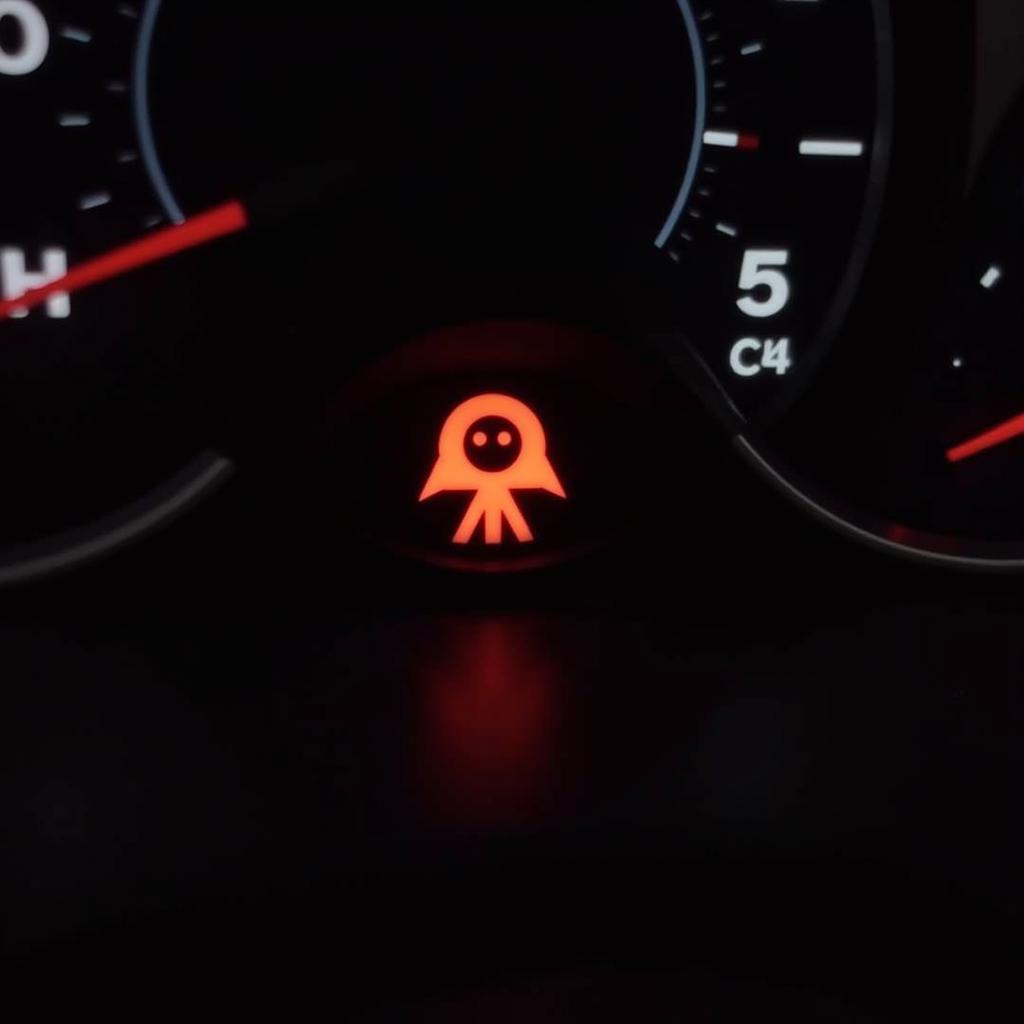The dreaded challenger brake warning light can be a real headache. It’s a signal that something isn’t right with your braking system, demanding immediate attention. This article dives into the common causes of challenger brake warning lights, diagnostic techniques, and potential solutions, empowering you to address this issue effectively. We’ll explore everything from simple fixes to more complex problems that may require professional assistance.
 Challenger Brake Warning Light on Dashboard
Challenger Brake Warning Light on Dashboard
One common cause for the challenger brake warning light is low brake fluid. Your brake system relies on hydraulic pressure, and insufficient fluid can significantly compromise its performance. This could be due to a leak somewhere in the system, or simply worn brake pads. Checking your brake fluid level is a simple process – locate the brake fluid reservoir under the hood and check if the fluid level is between the minimum and maximum markers.
Diagnosing Your Challenger’s Brake Warning
Beyond low brake fluid, several other issues can trigger the challenger brake warning light. A faulty ABS sensor, a malfunctioning parking brake switch, or even worn brake pads can all be culprits. How can you pinpoint the exact problem? Start by checking your owner’s manual for specific instructions related to your Challenger model. Many modern vehicles have self-diagnostic capabilities that can provide valuable clues.
If you’re comfortable working on your car, you can try some basic troubleshooting steps. Inspect your brake lines for leaks, check the condition of your brake pads, and examine the wiring connected to the ABS sensors. If you’re looking to upgrade your car’s entertainment system, check out how to change car radio to bluetooth.
Common Causes of Challenger Brake Warnings
- Low Brake Fluid: As mentioned before, this is a frequent cause and often points to a leak or worn brake pads.
- Worn Brake Pads: Thin brake pads can trigger the warning light. This is a normal wear-and-tear item and requires regular replacement.
- ABS Issues: Problems with the Anti-lock Braking System (ABS), such as a faulty sensor, can illuminate the warning light.
- Parking Brake Switch: A stuck or malfunctioning parking brake switch can also trigger the warning.
- Brake Line Leaks: Leaks in the brake lines reduce hydraulic pressure and compromise braking performance.
Remote Diagnostics and Software Solutions
In today’s technologically advanced world, remote diagnostics and software solutions are increasingly becoming valuable tools for troubleshooting car problems, including challenger brake warnings. These advanced systems can analyze data from your vehicle’s onboard computer, identify potential issues, and even suggest solutions.
Imagine being able to diagnose your Challenger’s brake problem from the comfort of your own home. Remote diagnostics can make this a reality. These systems can often pinpoint the issue more quickly and accurately than traditional methods. For instance, if you’re interested in upgrading your car’s audio, you can explore resources on how to install radio in car. You might also be interested in a bluetooth link to car radio. Or maybe you’re considering a wireless bluetooth radio adapter car kit.
What if I can’t find the problem?
If you’ve exhausted all the basic troubleshooting steps and still can’t identify the cause of your challenger brake warning, it’s crucial to seek professional assistance. A qualified mechanic has the expertise and specialized tools to diagnose and repair complex brake system problems.
“Ignoring a brake warning light can lead to serious safety risks. It’s always best to err on the side of caution and have a professional inspect your vehicle,” advises John Smith, Automotive Engineer at Smith Automotive Solutions.
Challenger Brake Warning: Conclusion
Addressing a challenger brake warning promptly is paramount for your safety. By understanding the potential causes, employing diagnostic techniques, and leveraging remote software solutions, you can effectively troubleshoot this issue. Remember, if you encounter a persistent or complex problem, seeking professional help is always recommended. If you are wondering about app compatibility with your car’s Bluetooth system, you might find this article helpful: can waze be used in any car radio with bluetooth. Addressing the challenger brake warning quickly and effectively ensures safe and reliable driving.

